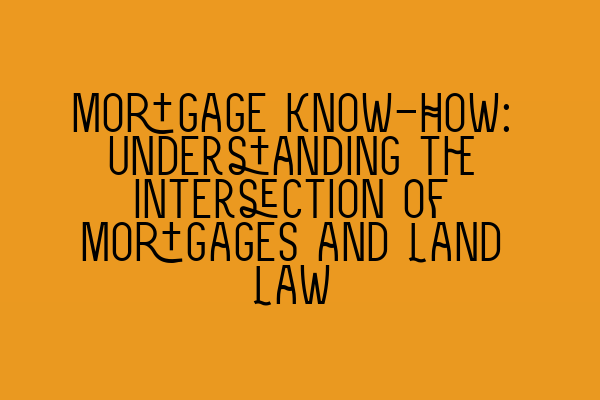Mortgage Know-How: Understanding the Intersection of Mortgages and Land Law
When it comes to property ownership and financing, mortgages play a pivotal role. Whether you are a first-time homebuyer or a seasoned investor, it is crucial to have a solid understanding of the intersection between mortgages and land law. In this article, we will dive into the key concepts and considerations surrounding mortgages, providing you with the know-how to navigate this complex legal landscape.
Mortgages and Land Law: The Basics
Before we delve deeper into the intricacies of mortgages, let’s start with a brief overview of land law. Land law governs the rights and interests in land, encompassing various aspects such as ownership, transferability, and use. It ensures that individuals have clear and enforceable rights in relation to their properties.
A mortgage, on the other hand, is a legal agreement between a borrower and a lender that allows the borrower to obtain funds to purchase a property. The property itself serves as collateral for the loan. In the event of default, the lender can take possession of the property and sell it to recover their investment.
Now that we have a basic understanding of both land law and mortgages, let’s explore some key elements that intertwine the two.
Mortgagor and Mortgagee: Roles and Responsibilities
In a mortgage agreement, there are two primary parties: the mortgagor and the mortgagee. The mortgagor is the borrower, typically the property owner, while the mortgagee is the lender, such as a bank or financial institution.
The mortgagor’s primary responsibility is to make timely payments on the loan, including both the principal and interest. Failure to do so can result in default, leading to potential foreclosure. On the other hand, the mortgagee’s main role is to provide the funds for the purchase and ensure the loan’s security through the mortgage agreement.
Understanding the rights and obligations of both parties is crucial to a successful mortgage arrangement. If you want to learn more about contractual capacity, rights, and limitations in the context of mortgages, check out this informative article on Understanding Contractual Capacity: Rights and Limitations.
Types of Mortgages
Not all mortgages are created equal. Depending on your circumstances and preferences, you can choose from several types of mortgages. Here are a few common ones:
Fixed Rate Mortgage
A fixed rate mortgage offers a fixed interest rate for a set period, typically ranging from 15 to 30 years. This means that your monthly payments will remain the same throughout the loan’s duration, providing predictability and stability.
Adjustable Rate Mortgage (ARM)
An adjustable rate mortgage, or ARM, has an interest rate that fluctuates over time based on market conditions. Initially, ARM rates may be lower than fixed rates, but they can increase or decrease after a specified period. It’s essential to carefully consider your financial situation and risk tolerance before opting for an ARM.
Interest-Only Mortgage
With an interest-only mortgage, borrowers are only required to pay the interest portion of the loan for a specific period, often five to ten years. After this initial period, the borrower must start making principal payments as well. Interest-only mortgages can be beneficial for those looking for lower initial payments but require careful financial planning to manage the transition.
To deepen your knowledge about mortgages, particularly the legal considerations related to mortgage types, we recommend reading Contract Law Reforms: An Analysis of Recent Changes.
Third-Party Rights and Mortgages
When entering into a mortgage agreement, it is vital to understand how third-party rights may impact your property. In some cases, a property may be subject to existing rights, such as easements or restrictive covenants, which can affect your ability to develop or use the land as desired.
Before finalizing a mortgage deal, it is crucial to conduct thorough due diligence and investigate any potential third-party rights that may encumber the property. Engaging a property law expert can help ensure that you have a comprehensive understanding of your property’s rights and limitations.
Mortgage Disputes and Resolutions
Disputes can arise in the context of mortgages, and it is vital to be prepared for such situations. Common areas of contention include default on payment, breach of mortgage terms, and foreclosure procedures.
In the event of a mortgage dispute, having an experienced property law solicitor by your side is invaluable. They can guide you through the legal process, negotiate on your behalf, and explore potential resolutions that align with your interests.
To enhance your understanding of contractual capacity and legal competence in the context of mortgage disputes, we recommend reading Contractual Capacity: Understanding Legal Competence in Contracting Parties.
Conclusion
Mortgages and land law are intricately intertwined, with numerous legal considerations to navigate. Understanding the roles and responsibilities of mortgagors and mortgagees, the various types of mortgages available, and potential third-party rights is crucial for anyone involved in property ownership and financing.
If you want to test your knowledge of contract law and explore more interactive SQE mock tests, make sure to check out our Interactive SQE Mock Tests for Contract Law: Test Your Knowledge. You can join our SQE contract law webinars for expert insights and guidance by visiting Join Our SQE Contract Law Webinars: Expert Insights and Guidance.
For expert advice and assistance with property law and land law matters, SQE Property Law & Land Law is here to help. Contact us today to schedule a consultation and discover how we can support your needs.
